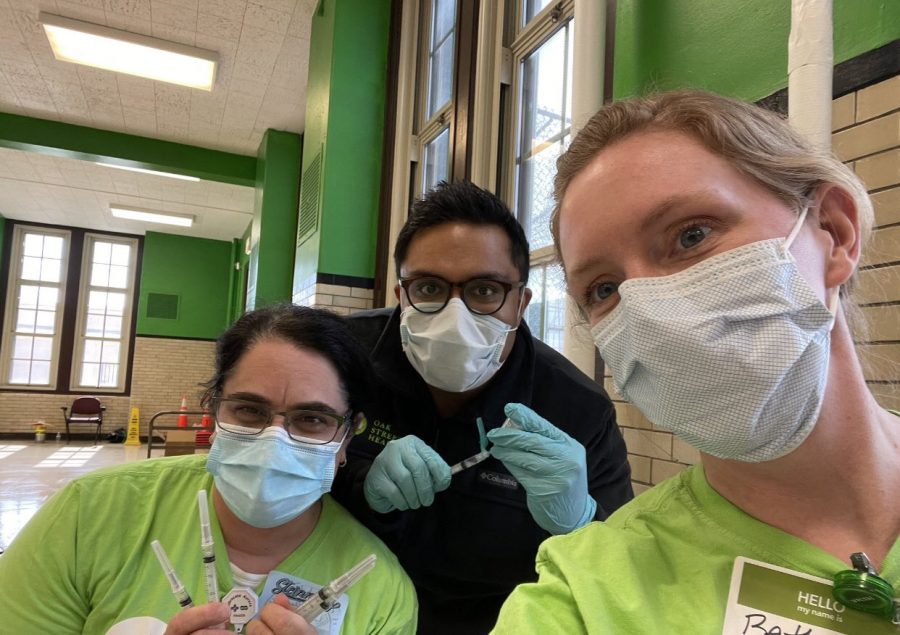Illinois medical professionals address COVID-19 vaccine inequity, withstand infodemic
Photo courtesy of Halleh Akbarnia
The Illinois Medical Professionals Action Collaborative Team seeks to address the COVID-19 pandemic’s vaccine inequity and “infodemic” by disseminating information.
April 15, 2021
As COVID-19 has spread across the nation, the distribution of misinformation has matched its virality. Some experts say the world is facing a second pandemic: an “infodemic.”
To reduce the impacts of this misinformation, some Illinois healthcare professionals are seeking ways to dispel vaccine hesitation and advocate for vaccine equity, both individually and collectively. In Illinois, the Illinois Medical Professionals Action Collaborative Team formed in March 2020 to disseminate COVID-19 information and to widen healthcare workers’ impact at the state level.
IMPACT community outreach director Halleh Akbarnia said people have had to “hunt” for appointments, facing difficulties due to varying distribution across states and cities and the lack of a centralized source for vaccination information.
Though the state recently expanded vaccine eligibility to Illinois residents outside of Chicago aged 16 and older, IMPACT co-founder and chief medical officer Laura Zimmermann said inequity exists at multiple levels of the vaccination process.
Often, vaccine information is provided primarily in English and online. These factors, compounded with the fact that appointments are offered on a first-come, first-serve basis, means those who don’t have internet access or the time to constantly refresh these pages are “inherently disadvantaged,” Zimmermann said.
“Unfortunately, that leaves out a lot of communities that have suffered over the years, from systemic racism and systemic violence,” Zimmermann said. “Those communities are the ones who are most affected by COVID-19, frankly devastated by COVID-19, in many cases.”
IMPACT addresses this concern by working directly with these communities. In collaboration with other local organizations, Akbarnia said IMPACT members have sent a mobile team of volunteers to go door-to-door in marginalized and underserved communities to encourage and reassure people about vaccines.
This mobile team has also administered vaccines at senior homes.
“We send volunteers into a lot of these communities to actually physically do the work,” Akbarnia said. “We don’t want to just be words — we want to be able to actually have action to what we say as well.”
To bridge the language barrier, IMPACT also created bilingual infographics and partnered with the Chicago Public Library to provide multilingual vaccine presentations.
The organization has also extended its outreach to schools. Akbarnia said members answered questions at Erie Elementary Charter School, which is located in a predominantly Latine community where over 50 percent of the school is Spanish-speaking.
Before IMPACT spoke with them, Akbarnia said about 50 percent of the school’s teachers registered for a vaccination appointment. Since members addressed some of the teachers’ vaccine hesitations, Akbarnia said 97 percent are now vaccinated.
To IMPACT co-founder and chief operating officer Shikha Jain, the organization is an opportunity to provide clear medical information to the public and clear up confusion about COVID-19.
Jain, a FOX 32 Chicago contributor, uses her weekly segment to simplify the latest COVID-19 news. Her goal is to communicate public health messages to as wide an audience as possible .
“There’s so much good that can be done by healthcare professionals using their voices and their background and their education to disseminate information in ways that (are) digestible and easy to understand,” Jain said. “It can really have a major impact—it can truly save lives.“
Zimmermann and other IMPACT members have been recruiting volunteers to vaccination sites in target communities, including the Protect Chicago Plus site at Rush to promote equitable vaccine distribution.
She said the clinic is a “joyous atmosphere.” On Easter, Zimmermann met people who were planning to see their grandkids for the first time in several months after receiving their second dose.
“People are grateful to be there, people are grateful to be working there,” Zimmermann said. “Even if I go there and I only vaccinate 40 people, it is incredibly rewarding to know that I’ve made a real potential difference in 40 people’s lives.”
IMPACT members have also addressed vaccine inequity in the healthcare community itself. After discovering Phase 1A-eligible healthcare workers at smaller institutions were unable to get vaccinated, IMPACT chief policy officer Ali Khan used his position at Oak Street Health to provide these medical professionals with vaccines.
In an effort to organize vaccine information, IMPACT created a document with links to vaccination sites, helpful hints for scheduling appointments and a list of vaccination events by county. Akbarnia said she regularly updates this document.
Still, Jain said she’s concerned inequities will persist both with the vaccine and within the healthcare system.
“Hopefully one day, when the pandemic is a bit more in our rearview mirror, we will be able to focus on many other healthcare issues that exist and try to move things forward and improve things in the healthcare system as a whole across Illinois,” Jain said.
Email: [email protected]
Twitter: @amittal27
Related Stories:
— The Daily’s COVID-19 vaccination guide: what you need to know and how to get a COVID-19 vaccine
— As vaccine hesitancy threatens to increase COVID-19 disparities, local experts try to build trust


